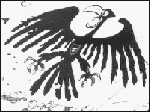| About Trikont More | Home | |
| I first discovered Trikont
when I was introduced to the extraordinary phenomenon which is Alpine
new wave music and, in particular, Attwenger,
a duo of Austrians with attitude, something like The Pogues. Since then I┤ve discovered the slightly less radical Bavarian group Die Well-Buam (The Well Boys), and Excellent compilations of Cajun and klezmer music as well as a couple of CDs called Dead and Gone Of funeral marches and songs of death. 
If you happened to see BBC 2┤s ┤Dance Night` over the Christmas period you may remember regular stings of Alexei Sayle and Deborah bull entwining to diverse arrangements of the Spanish song ┤La Paloma`-you guessed it - all taken from a three volume Trikont CD series featuring 75 versions of what the label claims is the most-recorded song this century: From the French Garde RÚpublicaine in 1899 via Bing Crosby and Paul Whiteman (1924), Jelly Roll Morton (1938), Charlie Parker (1952), Carla Bley (1983) and Flaco Jimenez (1986) to an unknown Harpist in the Paris metro in 1995. With reviews of two new discs of Finnish tango and Vietnamese street Music in this issue you┤ll understand why the label is hard to define. Trikont, which was founded in Munich in 1971, is run by philosophy and political science graduate Achim Bergmann, and what you wouldn┤t guess from the catalogue today is that it grew out of a small left-wing Publishing house that was distributing Chairman Mao┤s Little Red Book and the Diary of Che Guevara. ┤We were part of the non-dogmatic, "sponti" left/radical people,┤explains Bergmann.  `All important things are political and we wanted to put out the music
of the people that was not available in Germany at that time.┤
`All important things are political and we wanted to put out the music
of the people that was not available in Germany at that time.┤Trikont`s motto `Unsere Stimme┤(`Our Voice┤) is a legacy of that time and so are albums of consciousness raising Native American songwriters Floyd Westerman and Willy Dunn. `The emphasis They put on the spiritual and ecological aspects of life inspired us to look at our own Bavarian area and Express our regional identity.┤ The fruits of this inspiration came with Attwenger and other Alpine groups In the early 1990s. Attwenger was certainly the most successful of these, touring to Vietnam and Africa and proving that the music could be local, radical and of global interest all at the same time.  Bergmann met Folkway┤s Moses Asch (mentioned below) in the 1980s and
distributed the label┤s titles In Germany. There┤s much in common
between the Folkways and Trikont ideals, both politically and in their
aim in making connections between music and everyday life. Trikont┤s
biggest seller is singer/songwriter Hans
S÷llner, whom Bergmann describes as a sort of Bavarian Billy Bragg.
Bergmann met Folkway┤s Moses Asch (mentioned below) in the 1980s and
distributed the label┤s titles In Germany. There┤s much in common
between the Folkways and Trikont ideals, both politically and in their
aim in making connections between music and everyday life. Trikont┤s
biggest seller is singer/songwriter Hans
S÷llner, whom Bergmann describes as a sort of Bavarian Billy Bragg.`No radio station will play him because he┤s always criticizing politicians, but people like him very much. He┤s a hero of the young masses in Bavaria and Austria. We┤ve sold well over half-a-million of his records.┤ another important ingredient in the catalogue is the collection of archival compilations. Several of these are, as you would expect, reissues of rare German Shellac recordings of folkmusic from Munich, Bavaria, Salzburg and Vienna, but there is also Yikhes, one of the best collections of European and American klezmer 78s, and American compilations of hillbilly music, yodelling and soon - songs of ruffians and criminals. What makes a Trikont disc, says Bergmann ┤is intensity and a connection with real life. This is what ┤s left of our political stance. For us music is not just music` (Songline) |